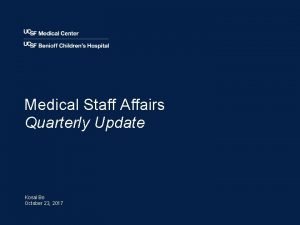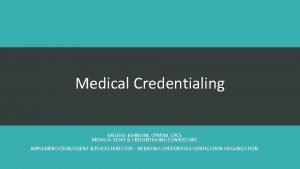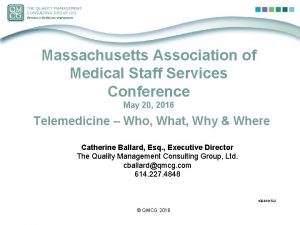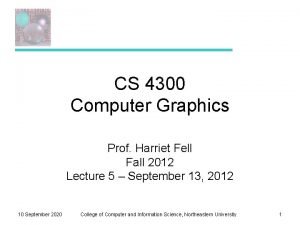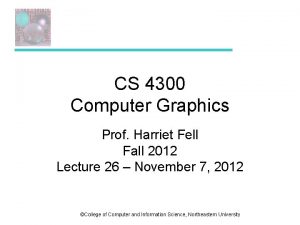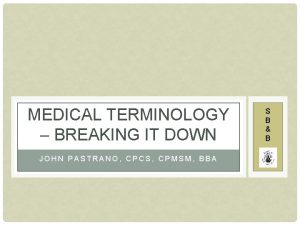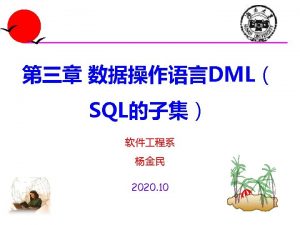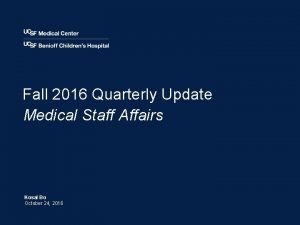Medical Staff Affairs Harriet J Cherok RN CPCS


















- Slides: 18

Medical Staff Affairs Harriet J. Cherok, RN, CPCS Director- Medical Staff Affairs Director- Credentials Verification Organization (CVO)

Medical Staff Affairs Role and Responsibilities • Coordinates the credentialing process and granting of clinical privileges for faculty physicians, APPs and other Licensed Independent Practitioners • Initial appointment to the WVUH Medical Staff • Reappointment to the WVUH Medical Staff every two years Focused Professional Practice Evaluation (FPPE) • Focused Professional Practice Evaluation (FPPE) involves more specific and time-limited monitoring of a provider’s practice performance in three situations: 1) When a provider is initially granted clinical privileges; • Occurs at 3, 6, 9, and 12 months 2) When new privileges are requested for an already privileged provider; • Occurs at 3, 6, 9, and 12 months 3) When performance/quality of care concerns involving a privileged provider are identified (through the OPPE process or by any other means such as complaints or significant departure from accepted practice).

Medical Staff Affairs Role and Responsibilities Continued • Ongoing Professional Practice Evaluation (OPPE) is intended as a means of evaluating professional performance on an ongoing basis for three reasons: 1) As part of the effort to monitor professional competency; 2) To identify areas for possible performance improvement by individual practitioners; 3) To use objective data in decisions regarding continuance of clinical privileges.

Practitioner Health Committee • The West Virginia University Hospitals Practitioner Health Committee serves as the primary resource in the management of impaired Practitioners. • Impairment includes any physical, mental, behavioral or emotional illness that may interfere with the Practitioners ability to function appropriately and provide safe patient care. The purpose of impaired Practitioner assistance is to maximize support for Practitioners through appropriate interventions. • This process relates specifically to mental, physical or behavioral impairment and does not include performance management or disciplinary actions. Brad Hall, MD- Executive Medical Director, WV Medical Professionals Health Program Jim Berry, DO- Chair, WVUH Practitioner Health Committee Harriet J. Cherok, RN, CPCS- Coordinator- WVUH Practitioner Health Committee

Professional Conduct/Performance Expectations PEOPLE • • Communication – Effective communication skills (open, honest and direct). Teamwork – Ability to function as an effective team member. SERVICE • • Customer Service – Treats patients, families, visitors and coworkers with respect – 100% of the time. Resource Management – Utilizes organizational resources effectively. PERFORMANCE IMPROVEMENT • • Cost/Quality – Identifies opportunities to improve performance – quality and cost. Change Capacity – Proactively responds to change. SHARED VALUES/CULTURE • • • Personal Effectiveness – Committed to doing the best work possible at all times. Ethics and Integrity – Strong personal ethics and good personal judgment. Initiative – Takes ownership and initiative for work performed.

Professional Conduct/Performance Expectations Continued DISRUPTIVE BEHAVIOR • “Disruptive behavior” is a pattern which demonstrates that a practitioner is unable or unwilling to work with others to such an extent that this or other behavior, through words or actions, has the potential to interfere with patient care. It is behavior/conduct which interferes with respectful, caring relationships, threatens the satisfaction and safety of both patients and employees, is disruptive to the operation of the Hospital and has the potential to interfere with the delivery of high quality patient care. • Disruptive behavior will not be tolerated within WVUH, and a corrective action approach will be followed regarding disruptive behavior.

Dress Code ID Badges must be worn at all times. Employee name and picture must be visible. Hair should be kept neat and clean and pull back if necessary. Light-scented cologne, perfume, lotion, or aftershave is permitted. Seasonal holiday clothing (tops, socks, ties) must be consistent with overall appearance standards. Seasonal holiday clothing may only be worn from November 15 th to January 1 st. Appropriate West Virginia University T-Shirts, sweat shirts or Polo shirts may be worn on both away and home football game days by employees. Appropriate shirts may also be worn on Friday’s when games are being played on Saturdays. All shirts that are worn must be appropriate. Denim clothing or jeans of any color are not acceptable. * Please refer to Hospital policy V. 250 (Dress and Appearance) for further information.

Dress Code Continued Medical Staff and Hospital Personnel are authorized to wear Hospital provided blue scrub suits only in the following work areas: Ø Ø Ø Operating Room Recovery Room Radiology (Mobile & Operating Room technologist) Labor and Delivery Cardiac Catheterization Lab Central Processing Pathology Gross Lab(s) Pharmacy (per departmental policy) Special Diagnostics Bone Marrow Unit Clinical Laboratory (Morgue) Hospital provided scrub suits should not be worn outside the hospital.

Dress Code Continued Disciplinary actions will be taken for wearing these scrubs out of the hospital: ► 1 st Offense – Loss of meal card for 1 week ► 2 nd Offense – Loss of meal card for 1 month ► 3 rd Offense – Loss of meal card for 12 months and a letter from Medical Staff Affairs placed in the resident’s GME professional portfolio relating to the resident’s inability to comply with standards of professionalism and systems-based practice.

Dress Code Continued Two sets of jade green scrubs are provided at no charge to incoming residents. They belong to you and there are no restrictions for wear. * Specific colored scrubs may be required by some departments (i. e. , Emergency Department – Black).

Meal Cards Residency Coordinators will issue meal cards on July 1 st and January 1 st of each year. Amounts are based on Department, PGY level, amount of call, etc. The cards are considered “on call” meal cards to supplement your meals when you are on call. The daily limit for card use is $30. 00. The purchase of Starbucks gift cards with your meal cards is not permitted. If you lose your meal card, report immediately to the Nutrition Services Office on 4 th floor of Ruby for a replacement. * There is a $5. 00 replacement fee

Delinquent Medical Record Documentation Section IV- Rules and Regulations of the Medical Staff D. Delinquent Records and Suspension of Physician Privileges 1. Any member of the medical staff who has deficient medical records as defined in Amendment 1 of the WVUH Medical Staff Bylaws shall be eligible for suspension of privileges. 2. The following items are due within 24 hours and assignment of incomplete documentation is sent via in basket notice to the physician. If the assignment remains incomplete at 7 days, a notification is sent via in basket message that the assignment is now deficient. If the assignment continues to remain incomplete, the incomplete documentation is delinquent and suspendable at 14 days: a. H&P b. H&P Update c. Coding Queries 3. The following items are due within 48 hours and assignment of incomplete documentation is sent via in basket notice to the physician. If the assignment remains incomplete at 7 days, it will be considered deficient. If the assignment continues to remain incomplete, a notification is sent via in basket message that the incomplete documentation is delinquent and suspendable at 14 days: a. Outpatient Encounters

Delinquent Medical Record Documentation Continued Section IV- Rules and Regulations of the Medical Staff D. Delinquent Records and Suspension of Physician Privileges 4. The following items are due within 12 hours, notification of deficiency is sent to the physician via in basket at 72 hours, and suspendable at 7 days: a. Procedure and Operative Notes b. Discharge Notes 5. Notification of Providers: a. Weekly warning notifications are sent to providers who have deficient records (as defined in D. 2 and D. 3) via EPIC in basket. b. A compiled list of providers who are approaching suspension in the next 24 hours is sent via email to all affected providers as well as Department Chairs and Department Administrators. 6. Suspension - Providers not completing their deficiencies within the timeframe described in D. 2 and D. 3 will be notified of their suspension via EPIC in basket. 7. Suspension may be deferred if the provider has a professional absence, vacation, illness or other extenuating circumstances, at the discretion of the Medical Staff Affairs Office. Residents appearing on the suspension list will have their meal cards suspended until the delinquent documentation is completed.

APPENDIX L: RESIDENT AND ATTENDING PHYSICIAN PATIENT CARE ACTIVITIES AND SUPERVISION RESPONSIBILITIES Purpose 1. To define the role, responsibilities and patient care activities of resident physicians. 2. To define the process for supervision of resident physicians by a licensed independent practitioner who is a member of the WVUH medical staff. ► In general, WVUH expects that each resident must know the limits of his/her scope of authority, and the circumstances under which he/she is permitted to act with conditional independence. ► In particular, PGY-1 residents should be supervised either directly or indirectly with direct supervision immediately available.

APPENDIX L: RESIDENT AND ATTENDING PHYSICIAN PATIENT CARE ACTIVITIES AND SUPERVISION RESPONSIBILITIES ► The checked boxes in the grids below indicate the level of training where a resident would require direct supervision in order to perform that procedure. The responsibility remains with the attending physician to assess the competency level of an individual resident to require a higher level of supervision/limitation of clinical responsibilities as determined appropriate. Neurology Residents Clinical Responsibilities and Procedural Supervision Requirements Peripheral Venous Access Gastric Tubes – NG/Dobhoff Defibrillation – Chemical/Electrical Lumbar Puncture Nasogastric Lavage Venous Sampling Central, Peripheral Sedation, Moderate Nerve Conduction Studies Electroencephalography (EEG) Review and Interpretation of CT Brain for Acute Presentations PG 1 X X X X X PGYII X X PGYIII X PGYIV X

EPIC/Security • User IDs and Passwords—To implement the need-to-know process, WVUH requires that each user accessing WVUH electronically stored confidential or sensitive information have a unique User-ID and a private password. The unique User-ID must be consistent with the employee’s name (except for systems that automatically generate the User-ID) as recognized by Human Resources. The User-ID must be employed to provide the minimum necessary information and restrict system privileges based on job duties, project responsibilities, and other business activities. Each user is personally responsible for his or her User-ID and password activity. • Sharing Passwords—Passwords must never be shared with or revealed to others. System administrators and other technical information systems staff must never ask a user to reveal their personal password. The only time a password should be known by another is when it is issued. These temporary passwords must be changed the first time the authorized user accesses the system. If a user believes that someone else is using his or her user ID and password, the user must immediately notify the Call Center at 598 -4357 for assistance in changing their password. The Call Center personnel will notify the appropriate system administrator or security specialist for the information system. They will also notify the WVUHS Information Security Officer of the incident.

Medical Staff Affairs Staff HARRIET (MUFFY) CHEROK, RN, CPCS- DIRECTOR BARBARA LOWE ADMINISTRATIVE ASSISTANT, MEDICAL STAFF AFFAIRS DONNA LEEPER, RN QUALITY NURSE SPECIALIST MEDICAL STAFF COORDINATORS: • MICHELLE GOAD • DIANE KAVANAUGH • MEGHANN MUNDY • SHARON PATRICK • STACEY PATTERSON • ELLEN SEESE • ANDREA SUKERUKSA MAIN PHONE NUMBER: (304) 598 -4156

 Kepentingan persuratan kerajaan alam melayu
Kepentingan persuratan kerajaan alam melayu Medical staff affairs
Medical staff affairs Cpcs medical
Cpcs medical Florida association of medical staff services
Florida association of medical staff services Important dates for harriet tubman
Important dates for harriet tubman Harriet powers bible quilt
Harriet powers bible quilt Underground railroad painting
Underground railroad painting Harriet tubman
Harriet tubman Harriet quimby
Harriet quimby Harriet jacobs and frederick douglass
Harriet jacobs and frederick douglass Harriet fell
Harriet fell Harriet tubbmen
Harriet tubbmen Harriet kung
Harriet kung Harriet hemings
Harriet hemings Harriet tubman comic strip
Harriet tubman comic strip Facts about harriet quimby
Facts about harriet quimby Harriet kung
Harriet kung Harriet shetler
Harriet shetler Cs 4300
Cs 4300

